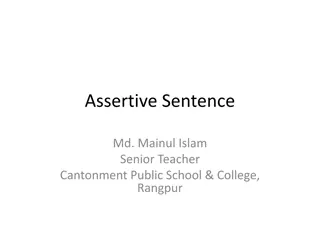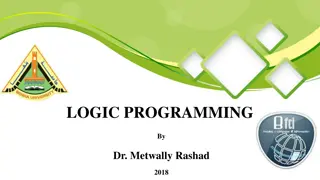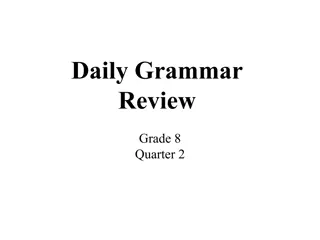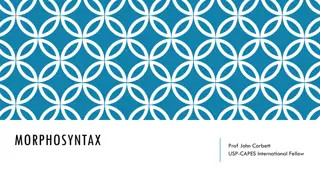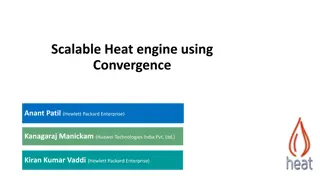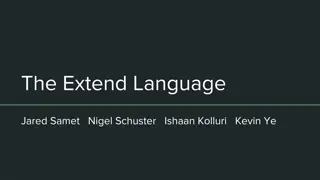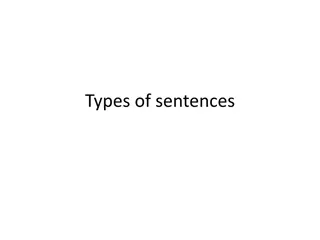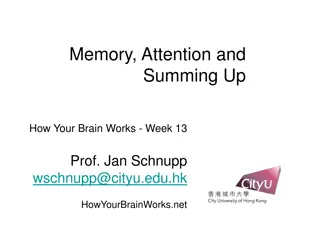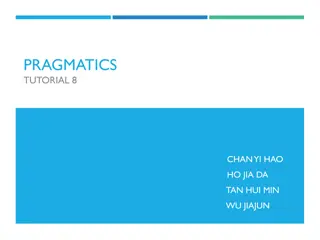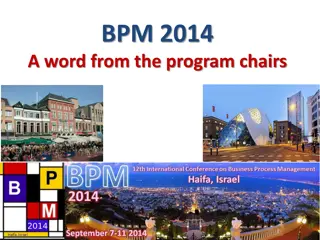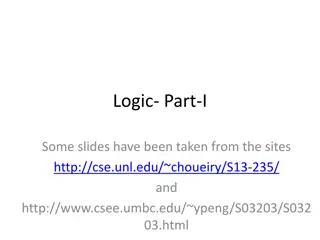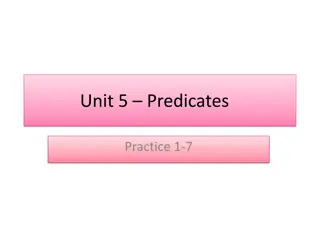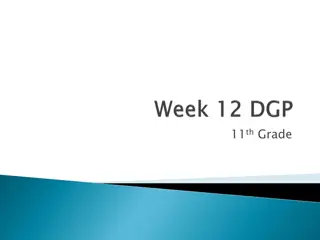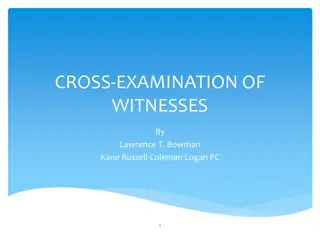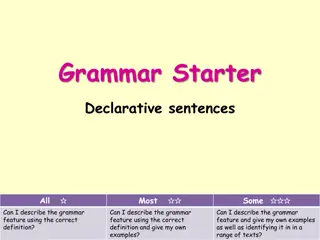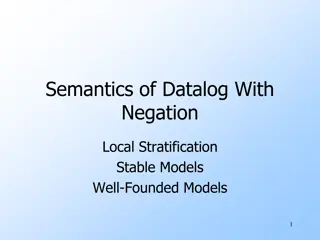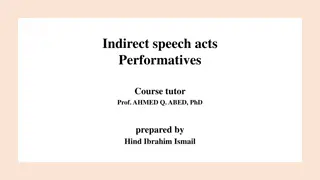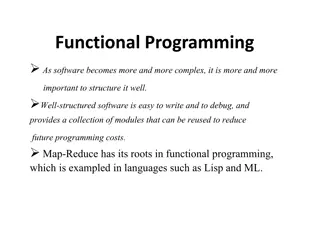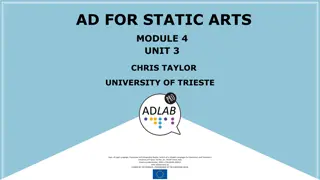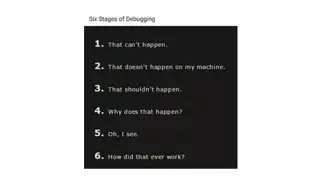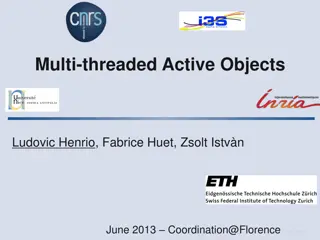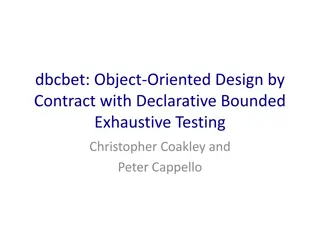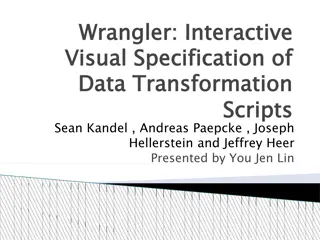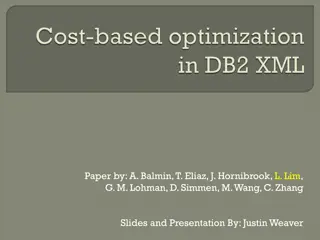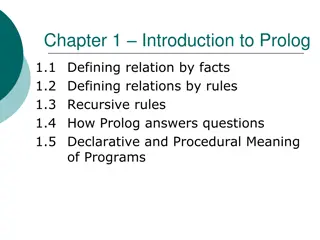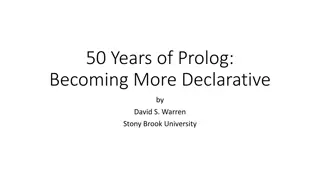Functional Programming
Functional programming, a paradigm that emphasizes declarative programming, pure functions, and limited side effects. Explore the benefits and characteristics of functional programming languages.
0 views • 20 slides
Language Study Community – Enhance Your Language Skills
Joining a Language Study Group is a fantastic way to take your language learning to the next level. By leveraging the power of Group Study, you can immerse yourself in the language, enhance your understanding, and build confidence in your speaking abilities. Read full article \/\/explainlearning.com
1 views • 3 slides
Academic Language Demands and Supports in Instructional Planning
Academic Language Demands and Supports are crucial in educational settings to ensure comprehension and usage of language by students. This content discusses embedding language demands in lesson plans, providing language supports, and peer review activities to enhance academic language skills. The fo
6 views • 10 slides
The Significance of Media in Language Learning
Media plays a crucial role in language learning by raising awareness of the ideology behind linguistic structures and providing valuable information on society and culture. Linguists are drawn to media language for research purposes and to understand its impact on language use and attitudes. Media s
11 views • 5 slides
Understanding Translation: Key Concepts and Definitions
Translation involves transferring written text from one language to another, while interpreting deals with oral communication. Etymologically, the term "translation" comes from Latin meaning "to carry over." It is a process of replacing an original text with another in a different language. Translat
11 views • 76 slides
Understanding Sentence Types and Structure
Explore the types of sentences - Assertive, Interrogative, Declarative, Imperative, and Exclamative, each serving a unique purpose in communication. Learn about sentence patterns, word order, and examples for better comprehension.
4 views • 8 slides
Understanding Logic Programming and AI Principles
This course focuses on logic programming principles applied to AI problems. Topics include Prolog programming, backtracking, recursive rule definition, built-in predicates, lists manipulation, and advanced techniques. Declarative languages like Prolog differ from procedural languages by describing p
1 views • 26 slides
Daily Grammar Review Challenges for Grade 8 Students
Engage in a week-by-week grammar review for 8th-grade students. The lessons consist of identifying declarative or interrogative sentences, punctuating sentences with periods or question marks, and distinguishing between exclamatory and imperative sentences. Enhance your grammar skills with daily exe
1 views • 61 slides
Understanding Predicators and Predicates in Sentence Semantics
Exploring the semantics of sentences, this content delves into the structure of declarative sentences in terms of predicators and arguments. It discusses various classes of items that can function as the predicator of a sentence, such as lexical verbs, the copulative verb "be" in equative sentences,
1 views • 39 slides
Understanding Mood and Modality in Morphosyntax with Prof. John Corbett
Today's session with Prof. John Corbett explores the final three sets of grammatical categories related to verbs: mood (fact or non-fact), modality (speaker's stance), and voice (subject's role). The session delves into the present-day English mood system, differentiating between various realization
1 views • 24 slides
Enhancing Language Learning Across the Curriculum in B.Ed. 1st Year Course
Language Across the Curriculum (LAC) emphasizes that language learning should occur across all subjects, not just in language classrooms. It highlights the importance of incorporating language development into every learning activity, fostering multilingualism in schools. Language plays a crucial ro
2 views • 34 slides
Speech and Language Developmental Milestones: A Bilingual/Multilingual Perspective
Speech and language developmental milestones are crucial for children, regardless of their home language. These milestones encompass receptive language, expressive language, pragmatics, and articulation and phonology. Understanding how a child hears and talks from birth to one year is essential, as
1 views • 23 slides
Overview of Scalable Heat Engine using Convergence
Anant Patil and Kanagaraj Manickam discuss a scalable heat engine using convergence architecture, offering insights into design evolution, comparison, and progress. The presentation covers an orchestration service to manage cloud applications, including modeling, deployment, scalability, configurati
0 views • 33 slides
Explore the Extend Language for Declarative Programming
Unveil the Extend language, inspired by the restrictions of spreadsheets, offering a declarative programming approach for reusability. Dive into its basic architecture, lazy evaluation of values, variables handling, and syntax for list comprehensions. Discover its current project status, spanning ov
3 views • 19 slides
Understanding the Four Types of Sentences
Declarative, imperative, interrogative, and exclamatory sentences each serve a unique purpose in communication. Declarative sentences state facts, imperatives give commands, interrogatives ask questions, and exclamatory sentences express strong emotions. By recognizing the characteristics of each ty
0 views • 18 slides
Understanding How Your Brain Works: Memory, Attention, and Processing
Delve into the intricate workings of memory, attention, and cognitive processing in the brain as explored by Prof. Jan Schnupp. Discover the various types of memory, including short-term and long-term, procedural, declarative, and more. Explore the concept of working memory and its neuronal mediatio
0 views • 66 slides
Understanding Speech Act Theory and Pragmatics Tutorial
Dive into the intricacies of speech act theory with a focus on direct and indirect speech acts, illocutionary and perlocutionary forces, and performative verbs. Explore various linguistic forms including interrogative and declarative structures to understand how language can be used to convey intent
0 views • 35 slides
Business Process Management Conference 2014 Program Highlights
The BPM 2014 conference program features keynotes on Cognitive Computing and learning organizations, along with paper sessions covering various topics such as User Centered Process Approaches, Process Analytics, and Declarative Processes. The event includes tutorials, demos, submission statistics, g
0 views • 7 slides
Understanding Logic: An Introduction to Propositional Logic in Mathematics and Circuit Design
Logic plays a crucial role in mathematical reasoning, program design, and electronic circuitry. It is based on statements, known as propositions, that can be either true or false. A statement is a declarative sentence with a definitive truth value. Through examples, we explore the concept of stateme
0 views • 57 slides
Introduction to Language Technologies at Jožef Stefan International Postgraduate School
This module on Knowledge Technologies at Jožef Stefan International Postgraduate School explores various aspects of Language Technologies, including Computational Linguistics, Natural Language Processing, and Human Language Technologies. The course covers computer processing of natural language, ap
0 views • 27 slides
Understanding Predicates and Referring Expressions
Explore the concepts of predicates, referring expressions, and semantic structure in simple declarative sentences. Practice identifying referring expressions and predicators to enhance your understanding of sentence meaning and structure.
0 views • 12 slides
Influence of Native Americans on English Vocabulary
Words like cannibal, canoe, hurricane, and barbecue were borrowed from Native Americans, shaping the English language. The simple declarative sentence discusses this linguistic influence, highlighting subjects, verbs, and participial phrases. The images provide visual context to aid in understanding
0 views • 9 slides
Exploring Sociolinguistics: Language Variation and Social Factors
Sociolinguistics delves into the study of language variation influenced by social factors, examining the relationship between language and its social context. It explores various aspects like standard pronunciation, language choice, speech acts, language components, language variety, and factors suc
0 views • 73 slides
Mastering Cross-Examination of Witnesses in Legal Settings
Delve into the art of cross-examination with insights from Lawrence T. Bowman and Kane Russell Coleman Logan PC. Explore the power of cross-examination in uncovering truth, the competitive nature of trials, and the distinction between discovery depositions and trial cross-examination. Learn how to e
0 views • 41 slides
Understanding Assembly Language Programming for Computing Layers
Assembly language is a low-level programming language that enables direct interaction with a computer's hardware components. This content explores the fundamentals of assembly language, the relationship between human-readable machine language and binary code, an assembly language program for multipl
0 views • 31 slides
Examples of Declarative and Interrogative Sentences
Explore examples of declarative and interrogative sentences, understand their definitions, and learn to convert questions into statements. Dive into various texts to identify these sentence types and enhance your grammar skills.
0 views • 5 slides
Understanding Semantics of Datalog With Negation
Delve into the semantics of Datalog with negation, exploring the concepts of local stratification, stable models, well-founded models, and the importance of model selection in determining the meaning of Datalog programs. Discover the significance of ground atoms and the implications for declarative
0 views • 55 slides
Indirect Speech Acts Performatives Course Tutor Prof. Ahmed Q. Abed, PhD by Hind Ibrahim Ismail
Deborah Tannen's experience in Greece illustrates how indirect speech acts can convey unintended meanings. Performatives, as discussed by J.L. Austin, are declarative sentences that do not simply describe but actively change reality. Understanding sentence meaning requires considering not just truth
0 views • 12 slides
Understanding Functional Programming Paradigm
Functional programming emphasizes well-structured software that is easy to write and debug, with reusable modules to reduce future programming costs. It introduces higher-order functions and first-class function values, fostering declarative programming for tasks like symbolic data manipulation and
0 views • 21 slides
Understanding Language Anxiety in Foreign Language Learning and Teaching
Explore the impact of language anxiety on students and teachers in foreign language learning and teaching contexts through insights from Dr. Christina Gkonou's research. Delve into the theoretical background, implications for language education, and real-life experiences shared at the Essex Language
0 views • 25 slides
Understanding the Four Types of Sentences
Learn about the four types of sentences: declarative, interrogative, imperative, and exclamatory. Understand the differences between sentences and fragments, and see examples of each type in practice. Discover how to identify and use these different types of sentences effectively.
0 views • 9 slides
Grammar on the Go! Unit 5 Lesson 7 Sentence Corrections & Clauses
This content focuses on sentence corrections in red, defining vocabulary words, and understanding different types of sentences such as compound, complex, simple, and compound/complex. It also covers identifying sentence types like declarative, imperative, interrogative, and exclamatory. Additionally
0 views • 9 slides
Linguistic and Textual Features of Ad in Static Arts
Explore the linguistic and textual features of advertising in static arts, focusing on the use of present tense, short declarative sentences, and vivid vocabulary. Understand how cohesion, repetition, and non-finite verbs contribute to the impact of museum advertisements compared to general ads.
0 views • 23 slides
Understanding Declarative Programming and Regular Expressions
Declarative programming emphasizes describing the desired result rather than the computational processes, leading to domain-specific languages designed for specific problem domains. Regular expressions offer powerful pattern matching capabilities facilitating tasks such as parsing, querying database
0 views • 28 slides
Multi-threaded Active Objects: Issues and Solutions
The document delves into the realm of multi-threaded active objects, exploring their principles, limitations, related works, and solutions. It covers topics such as asynchronous method calls, first-class futures, and the risks associated with active objects. Additionally, it compares various approac
0 views • 29 slides
Object-Oriented Design by Contract with Declarative Bounded Testing
Comprehensive overview of Object-Oriented Design by Contract (DbC) with Declarative Bounded Testing, exploring its background, principles, implementation in programming languages, and application through bounded exhaustive testing. Learn how DbC enhances software reliability and development practice
0 views • 31 slides
Wrangler: Interactive Visual Specification of Data Transformation
Data wrangling is a crucial step before analysis, involving restructuring, correcting errors, and combining sources. Addressing the time-consuming nature of data preparation, Wrangler offers a user-friendly interface with a declarative transformation language, supporting various transforms and inter
0 views • 42 slides
Enhancements to DB2's Cost-Based Optimizer for XML Support
This paper discusses the acceptance of XML as a language for data interchange and the development of DB2 XML by IBM. It focuses on the extensions made to DB2's cost-based optimizer, emphasizing its support for XQuery as a query language. The paper also explores the largely declarative nature of XML
0 views • 20 slides
Overview of Prolog Programming Paradigm
Prolog is a logic programming language that defines relations through facts and rules, allowing recursive rules for powerful computations. It provides a declarative way of expressing programs and offers flexibility in knowledge representation. The language uses clauses, predicates, and variables to
0 views • 19 slides
Understanding Prolog: A Declarative Approach through the Years
Delve into the evolution of Prolog over the past 50 years, from its origins in natural language processing to its implementation and various features like tabling and negation. Explore the foundational concepts, syntax, and execution of Prolog, including its non-deterministic nature and recursive de
1 views • 21 slides





